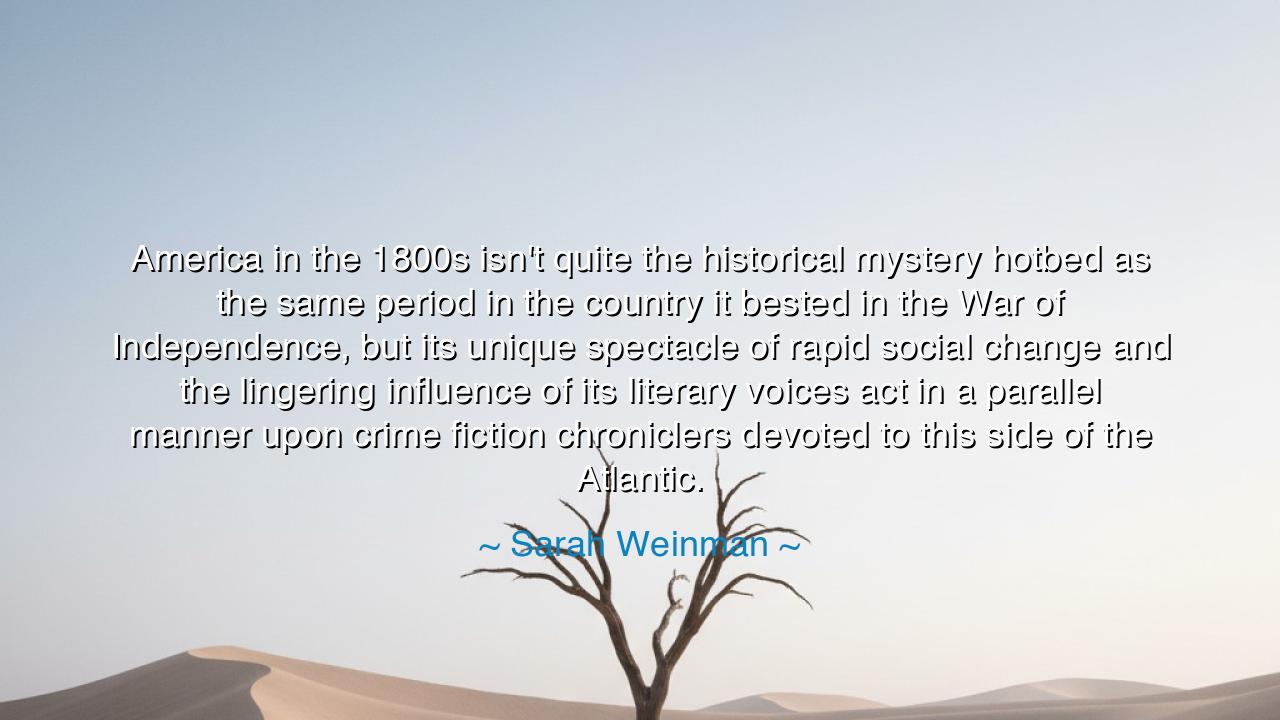
America in the 1800s isn't quite the historical mystery hotbed as
America in the 1800s isn't quite the historical mystery hotbed as the same period in the country it bested in the War of Independence, but its unique spectacle of rapid social change and the lingering influence of its literary voices act in a parallel manner upon crime fiction chroniclers devoted to this side of the Atlantic.






The words of Sarah Weinman, when she wrote, “America in the 1800s isn’t quite the historical mystery hotbed as the same period in the country it bested in the War of Independence, but its unique spectacle of rapid social change and the lingering influence of its literary voices act in a parallel manner upon crime fiction chroniclers devoted to this side of the Atlantic,” are not merely an observation of history, but a meditation on the soul of a nation in transformation. Beneath her analysis lies a truth that transcends literature — that the heart of America, forged in independence, beats differently from that of its forebears across the ocean. While England bathed in the shadows of mystery and fog, America burned in the light of change — restless, unfinished, and alive.
In these words, Weinman unveils the paradox of the nineteenth century — a century when the Old World and the New both wrestled with their own spirits. England, with its gaslit streets and class-bound mysteries, gave birth to the detective as a figure of order in a world of secrecy and sin. But America, she reminds us, was still a land in motion — its rapid social change a storm that swept away old certainties before they could harden into legend. Its cities grew like living beasts; its frontiers pushed endlessly westward. It was not mystery that defined it, but transformation. And yet, through that transformation, the seeds of mystery found their own soil, nurtured not by aristocratic intrigue but by the tension between freedom and the cost of progress.
To understand Weinman’s insight, one must look to the roots of American literature itself. For even as Dickens and Doyle chronicled the crimes of Victorian London, America produced voices that revealed the darkness beneath its own ideals. There was Edgar Allan Poe, whose tales of madness and death in cities like Baltimore and Philadelphia gave birth to the modern detective story. Poe was both poet and prophet — a man who gazed into the heart of a young nation and saw that liberty alone could not shield it from its own shadows. He taught the world that crime and conscience were not confined to England’s alleys, but could dwell just as deeply in the mind of the American dreamer.
And alongside him, as the century grew, came writers like Nathaniel Hawthorne and Herman Melville, who peered into the moral abysses of their age — not through the lens of the detective, but through the moral conflicts of the soul. Their America was not cloaked in mystery, but in guilt and revelation. Every Puritan town and every ship at sea became a metaphor for a nation trying to understand itself. These, too, were the chronicles of crime — not crimes of law, but of conscience, crimes born of ambition, secrecy, and the eternal battle between light and darkness. It is this tradition, Weinman reminds us, that acted “in a parallel manner” to England’s — different in form, but equal in depth.
Yet what made America’s literary landscape so unique was not only its moral questioning, but its speed. No other nation transformed so violently in so short a time. Between 1800 and 1900, America shed its colonial innocence, endured civil war, witnessed industrial might, and birthed a new kind of human restlessness. Its writers, like mirrors held up to history, captured this energy — this ceaseless reinvention. Crime fiction, too, evolved from this current, shaped by cities that were both symbols of hope and hives of corruption. The detective, reborn in American soil, became not a gentleman’s sleuth but a survivor — streetwise, skeptical, unromantic. The stories were not of class intrigue, but of justice against chaos, of the individual against the machine of modern life.
From this soil grew the lineage of American crime storytelling that would later conquer the twentieth century — from the hardboiled detectives of Dashiell Hammett and Raymond Chandler to the psychological webs of Patricia Highsmith and Sara Paretsky. Each carried the legacy of that nineteenth-century transformation, that “spectacle of social change” which Weinman so precisely evokes. For while England gave the world the image of the gentleman detective, America gave it the rebel investigator — one who seeks truth not for the sake of order, but for the sake of integrity. That, too, is the spirit of independence, reborn in narrative form.
So, O listener, hear the lesson hidden in Weinman’s words: that every age writes its mysteries according to its struggles. A society’s crimes reflect its conscience, and its storytellers are its historians of the unseen. The American 1800s may not have been a land of elegant fog and aristocratic murder, but it was a crucible of identity — where liberty itself was on trial, and where every voice, from Poe to Whitman, from Hawthorne to Alcott, contributed to the question: What does it mean to be free, and what price must freedom pay?
Thus, the teaching endures: that literature, like life, mirrors the transformation of nations. The independence that once won wars must also conquer ignorance; the change that built cities must also awaken the soul. Let us, then, honor the past not as imitation, but as inspiration. For in every age, on every shore, the great storytellers are those who see beyond the surface — who understand that beneath the march of history lies the eternal mystery of the human heart.






AAdministratorAdministrator
Welcome, honored guests. Please leave a comment, we will respond soon